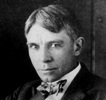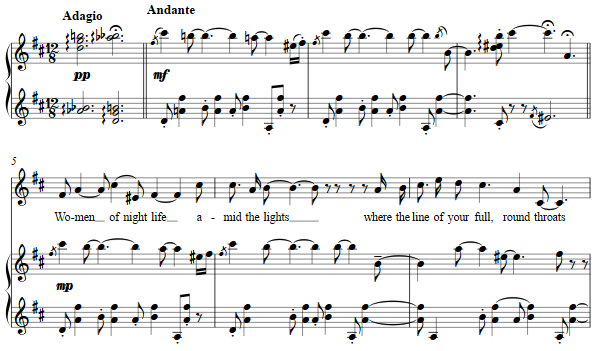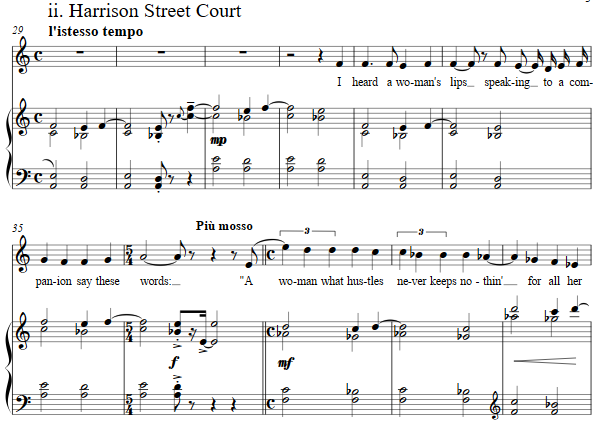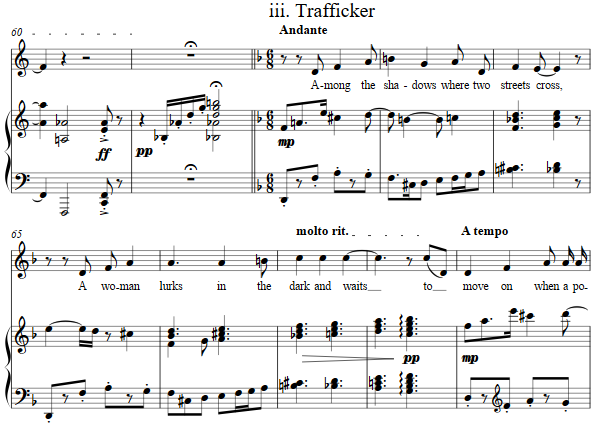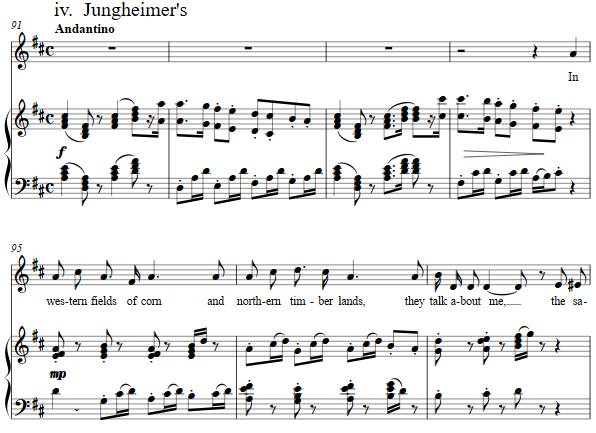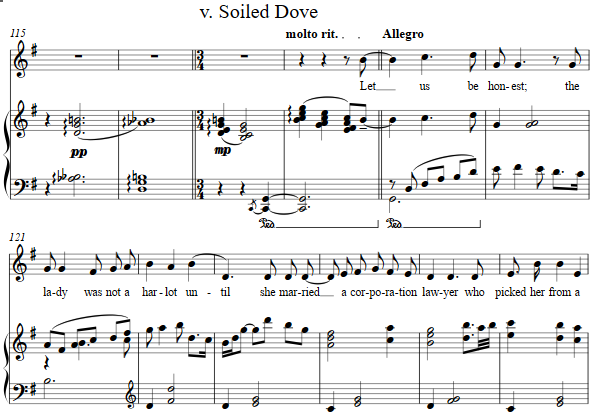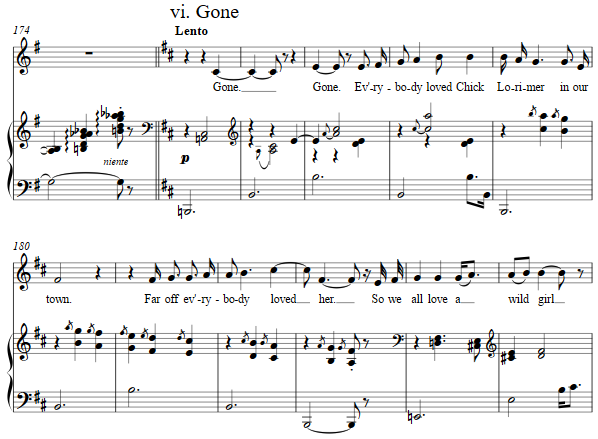Music and Texts of GARY BACHLUND
Vocal Music | Piano | Organ | Chamber Music | Orchestral | Articles and Commentary | Poems and Stories | Miscellany | FAQs
Broken Smiles - (2020)
Carl Sandburg
for medium voice and piano
i. It is much
Women of night life amid the lights
Where the line of your full, round throats
Matches in gleam the glint of your eyes
And the ring of your heart-deep laughter:
It is much to be warm and sure of to-morrow.
Women of night life along the shadows,
Lean at your throats and skulking the walls,
Gaunt as a bitch worn to the bone,
Under the paint of your smiling faces:
It is much to be warm and sure of to-morrow.
ii. Harrison Street Court
I heard a woman's lips
Speaking to a companion
Say these words:
"A woman what hustles
Never keeps nothin'
For all her hustlin'.
Somebody always gets
What she goes on the street for.
If it ain't a pimp
It's a bull what gets it.
I been hustlin' now
Till I ain't much good any more.
I got nothin' to show for it.
Some man got it all,
Every night's hustlin' I ever did."
iii. Trafficker
Among the shadows where two streets cross,
A woman lurks in the dark and waits
To move on when a policeman heaves in view.
Smiling a broken smile from a face
Painted over haggard bones and desperate eyes,
All night she offers passers-by what they will
Of her beauty wasted, body faded, claims gone,
And no takers.
iv. Jungheimer's
In western fields of corn and northern timber lands,
They talk about me, a saloon with a soul,
The soft red lights, the long curving bar,
The leather seats and dim corners,
Tall brass spittoons, a nigger cutting ham,
And the painting of a woman half-dressed thrown reckless
across a bed after a night of booze and riots.
v. Soiled Dove
Let us be honest; the lady was not a harlot until she
married a corporation lawyer who picked her from
a Ziegfeld chorus.
Before then she never took anybody's money and paidfor her silk stockings out of what she earned singing
and dancing.
She loved one man and he loved six women and thegame was changing her looks, calling for more and
more massage money and high coin for the beauty
doctors.
Now she drives a long, underslung motor car all by herself,reads in the day's papers what her husband is
doing to the inter-state commerce commission,
requires a larger corsage from year to year, and wonders
sometimes how one man is coming along with
six women.
vi. Gone
Everybody loved Chick Lorimer in our town.
Far off
Everybody loved her.
So we all love a wild girl keeping a hold
On a dream she wants.
Nobody knows now where Chick Lorimer went.
Nobody knows why she packed her trunk. . a few
old things
And is gone,
Gone with her little chin
Thrust ahead of her
And her soft hair blowing careless
From under a wide hat,
Dancer, singer, a laughing passionate lover.
Were there ten men or a hundred hunting Chick?
Were there five men or fifty with aching hearts?
Everybody loved Chick Lorimer.
Nobody knows where she's gone.
12 pages, circa 10' 45"
Carl Sandburg (1878–1967)
From his early "Chicago Poems" published in1916, these six texts are from a section in the larger collection as "Shadows," for medium voice and piano. In Sandburg's anthology, they follow the first (as a set of three) in Poems Done on a Late Night Car
. These six are composed, as one set to be performed as one.
The opening gesture, a five note chord, makes for two structures one the inverse of the other. This harmony becomes a 'curtain' or marker between the settings. Thereafter, a two-strophe setting in D major sings the first text, itself a two verse structure. The "women" of which Sandburg sings herein become more specific, as individuals are captured in the poems to follow.
D major yields to a darker Locrian based on A to link to the A flat and B flat of the "'curtain,' as two measure successions are repeated in octave displacement, and the text is declaimed in a long falling scale..
The 'curtain' falls on one text, as a second solidly in D minor tells of the prostitute on the Chicago streets.
Again, the ;curtain separates song settings, as a bright duple sings of a famous saloon. Sandburg's text mentions "nigger" while an alterative reading is suggested in the score. In the time of writing, the word did not incite such tensions as it does today. For those interested in another text's use of the term a half-century earlier, I suggest reviewing my poem, Jewish nigger
, as well as another discussion of words as poets have employed them for effect. The word was used, as in my settings of Countèe Cullen's Five Poems of Countée Cullen
, and a discussion of the topic is found as footnote to my setting of James Edwin Campbell's Echoes from the Cabin
.
In this duple dance-like setting, the saloon of Sandburg's imagery leaps to life.
Thereafter the 'curtain' delineates a next harmonic change, as the prose-like Soiled Dove is sung in a bright G major. Sometimes quasi-parlando, the text should be clearly enunciated.
Again, the 'curtain' breaks from G major to a final and dirge-like setting rooted on B minor, as another of these "soiled doves" with their broken smiles is remembered in the poetry of an American voice. A final appearance of the thematic curtain echoes above a final low D, and the overall setting is "gone."
The score is available as a free PDF download, though any major commercial performance or recording of the work is prohibited without prior arrangement with the composer. Click on the graphic below for this art song score.
